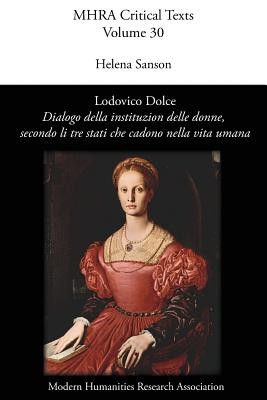
- We will send in 10–14 business days.
- Publisher: Modern Humanities Research Association
- ISBN-10: 1907322248
- ISBN-13: 9781907322242
- Format: 15.6 x 23.4 x 1.1 cm, minkšti viršeliai
- Language: English
- SAVE -10% with code: EXTRA
Lodovico Dolce, 'Dialogo della institution delle donne, secondo li tre stati che cadono nella vita umana' (e-book) (used book) | bookbook.eu
Reviews
Description
The first modern edition of Lodovico Dolce's Dialogo della instituzion delle donne, originally published in Venice in 1545 with the printing presses of Gabriele Giolito. A vernacular translation and adaptation (or plagiarism, according to some) of the 1538 edition of the De institutione foeminae Christianae by the Spanish humanist Juan Luis Vives, the Dialogo was one of the most successful works on female conduct written in sixteenth-century Italy. Dolce transformed Vives's didactic treatise into a dialogue, in which Flaminio teaches the widow Dorotea rules of conduct for the three stages of lay women's lives, that is, as unmarried girls, married women, and widows. Whilst indebted to its Latin source in terms of the ideas and precepts presented, and the many exempla used to substantiate them, Dolce's Dialogo is nevertheless also new and original. In the lively publishing market of the time, the fruitful collaboration between Dolce and Giolito targeted new circles of readers, including women, who were not necessarily familiar with Latin, and who welcomed translations and adaptations into the vernacular such as this. Contents include: a historical introduction to the author, his time, and his work; the Italian text with notes; a bibliography; an index of names. Helena Sanson is Reader in Italian Language, Literature, and Culture at the University of Cambridge (Department of Italian) and Fellow of Clare College.
EXTRA 10 % discount with code: EXTRA
The promotion ends in 22d.21:45:48
The discount code is valid when purchasing from 10 €. Discounts do not stack.
- Publisher: Modern Humanities Research Association
- ISBN-10: 1907322248
- ISBN-13: 9781907322242
- Format: 15.6 x 23.4 x 1.1 cm, minkšti viršeliai
- Language: English English
The first modern edition of Lodovico Dolce's Dialogo della instituzion delle donne, originally published in Venice in 1545 with the printing presses of Gabriele Giolito. A vernacular translation and adaptation (or plagiarism, according to some) of the 1538 edition of the De institutione foeminae Christianae by the Spanish humanist Juan Luis Vives, the Dialogo was one of the most successful works on female conduct written in sixteenth-century Italy. Dolce transformed Vives's didactic treatise into a dialogue, in which Flaminio teaches the widow Dorotea rules of conduct for the three stages of lay women's lives, that is, as unmarried girls, married women, and widows. Whilst indebted to its Latin source in terms of the ideas and precepts presented, and the many exempla used to substantiate them, Dolce's Dialogo is nevertheless also new and original. In the lively publishing market of the time, the fruitful collaboration between Dolce and Giolito targeted new circles of readers, including women, who were not necessarily familiar with Latin, and who welcomed translations and adaptations into the vernacular such as this. Contents include: a historical introduction to the author, his time, and his work; the Italian text with notes; a bibliography; an index of names. Helena Sanson is Reader in Italian Language, Literature, and Culture at the University of Cambridge (Department of Italian) and Fellow of Clare College.


Reviews